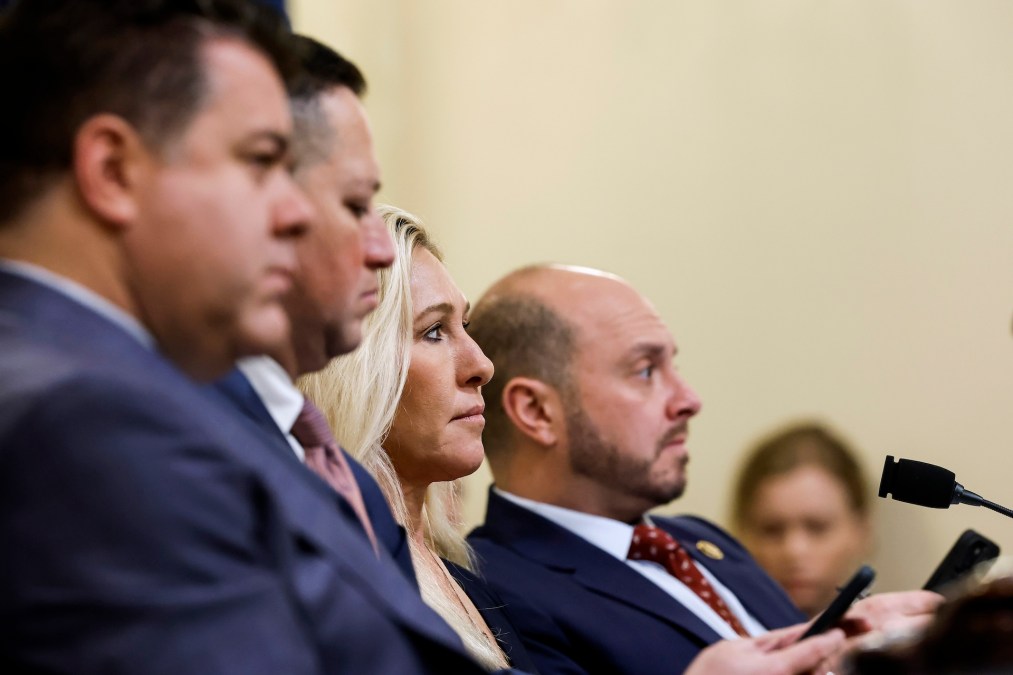House panel approves cyber information sharing, grant legislation as expiration deadlines loom

A House panel advanced legislation Wednesday that would reauthorize a major cyber threat information sharing law and a big-dollar state and local cyber grant program before they’re set to expire at the end of this month.
Trump administration officials and nominees, as well as cybersecurity organizations and experts, have voiced support for renewing them both as they near their respective lapses. Expiration of the information sharing law in particular has led industry groups and others to warn about dangerous ramifications about the collapse of cyber threat data exchanges.
At the House Homeland Security Committee markup, the panel also approved bills addressing pipeline cybersecurity and terrorists’ use of generative artificial intelligence.
The 2015 Cybersecurity and Information Sharing Act has provided legal protections to the private sector to share threat data with the federal government and between companies and organizations. The Widespread Information Management for the Welfare of Infrastructure and Government Act, which the panel approved 25-0, would reauthorize it for another 10 years, with updates.
“Reauthorizing this law and ensuring the relevance of this framework before it expires is essential for retaining our cyber resilience,” said Rep. Andrew Garbarino, N.Y., the chair of the committee and lead sponsor of the re-up legislation. The original legislation, he said, “changed the cybersecurity landscape forever, and for the better.”
The bill encourages the use of secure AI to improve technical capabilities, updates legal definitions to capture newer hacking tactics and seeks to preserve and strengthen existing privacy protections, he said.
The top Democrat on the committee, Bennie Thompson of Mississippi, said the committee should have approved a simpler reauthorization to give lawmakers and affected parties more time to take a look at the legislation’s changes to the 2015 law, but he supported moving the bill forward.
Garbarino said he had a good conversation Tuesday evening with his Senate counterpart, Homeland Security and Governmental Affairs Committee Chairman Rand Paul, R-Ky., about the path forward on the legislation.
Paul and other GOP lawmakers have said they want renewal of the 2015 law to include language prohibiting the Cybersecurity and Infrastructure Security Agency — which plays a large role in carrying out the law — from censoring speech, despite past responses from agency officials that they have not censored anyone. Garbarino’s bill doesn’t contain any provisions about that.
The panel voted 22-1 to approve the Protecting Information by Local Leaders for Agency Resilience Act, which would extend the State and Local Cybersecurity Grant Program for another 10 years. The program has doled out $1 billion.
“Many local governments have a long way to go to be prepared for cyberattacks from adversaries like the Chinese Communist Party,” said the bill’s sponsor, Rep. Andy Ogles, R-Tenn. He said that while “I usually want Washington to do less,” the federal government might have to foot the bill later anyway if it doesn’t help state and local governments shore up their defenses.
It would provide 60% of funds to state, local and tribal governments that are eligible, or 70% for those applying together. It would direct a federal outreach effort to smaller communities, and stress defense for both information technology and operational technology, Ogles said. Appropriators would still need to dedicate funding to the program, even if President Donald Trump signs it into law.
A coalition of tech and cybersecurity groups wrote to congressional leaders Tuesday urging them to extend the program, listing examples of how the grant program has defended against specific cyberattacks across the nation. “Without continued funding, hard-won progress will stall, and communities across the country will be left vulnerable — handing our adversaries a dangerous advantage,” their letter reads.
Paul hasn’t publicly indicated his plans for the expiring grant program. The two bills would provide new names for the things they are authorizing: WIMWIG replacing 2015 CISA, and PILLAR replacing the grant program.
The House Homeland Security Committee also voted 21-0 to advance the Generative AI Terrorism Risk Assessment Act, which would require the Department of Homeland Security to conduct annual assessments on how terrorist groups use artificial intelligence to carry out terrorist activity, such as seeking to radicalize potential recruits.
“Known terrorist organizations like ISIS or Al Qaeda or others have gone so far as to have AI workshops to train members on its use,” said the bill’s sponsor, Rep. August Pfluger, R-Texas.
And the committee voted 22-0 to approve the Pipeline Security Act that would codify the Transportation Security Administration’s pipeline security office into law and specify its responsibilities, including on cybersecurity. TSA wrote cybersecurity regulations in response to the 2021 Colonial Pipeline hack.
“We don’t just risk our national security, we risk supply chain disruptions that will create a ripple effect throughout our communities” if we fail to protect our pipelines, said the bill’s sponsor, Rep. Julie Johnson, D-Texas.






